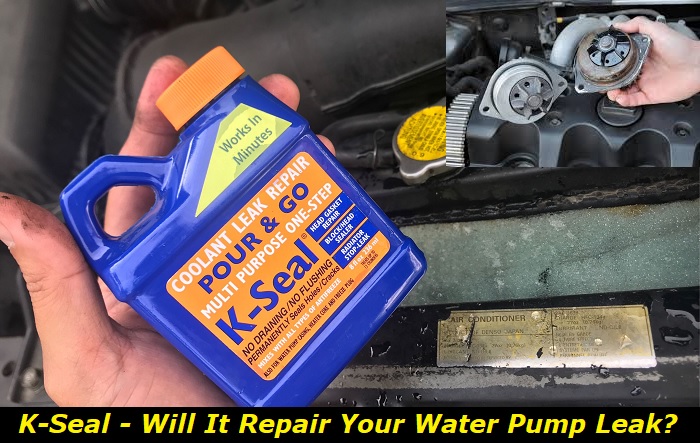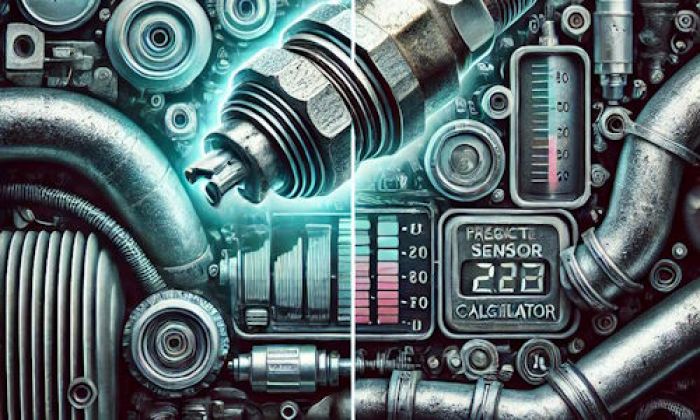If you're struggling with a water pump leak, don't be fooled into thinking K-Seal is the answer. Despite it being an easy choice, it won't actually resolve your issue. In this article, we'll help you understand why that's the case and provide guidance on what to do as an alternative solution!
Additives for leaks highlights
- Efficiency:close to zero
- Availability:agood deal of brands
- Average price: $35
- Way to use:pour into the coolant tank
- DIY use:yes
- Experts' advice:only biased advice
- Independent testing:onlynegative
- Consequences:contaminated coolant, contaminated cooling system, no effect whatsoever

What Is K-Seal?
Leaks are common in water pumps due to their constant exposure to high temperatures and pressure. As such, they need special attention when it comes time for repairs or replacements. K-Seal is a temporary sealant that can help stop small leaks temporarily but isn't suitable for larger ones as its effectiveness wears off over time. So if your water pump has suffered more considerable damage, then using K-Seal alone won't be enough to resolve the issue permanently - you'll need to take further action.
K-Seal is an award-winning, multi-purpose permanent repair solution for coolant leaks, cracked and blown head gaskets, heater core leaks, and other cooling system issues in the majority of petrol and diesel engines. K-Seal's unique formula creates a seal that locks itself into place with heat from the engine to ensure a permanent repair.
K-Seal contains specially formulated resins, polymers, and additives that are designed to cure quickly, forming an unbeatable seal in the majority of engine types. It has been proven to work effectively in over 6 million applications around the world and is now available for consumers worldwide. So why won't K-Seal fix a water pump leak?
What Are the Symptoms of Water Pump Leak?
The most common symptom of a water pump leak is a visible pool of coolant fluid leaking from the car's engine. Other symptoms may include an overheating engine, steam coming from the hood, and strange noises coming from the water pump area when running the car.
Additionally, if there is a crack in the gasket or seal that connects the water pump to the engine, it can cause coolant to leak from the area. You may also find that your car is not running as efficiently as it should and may experience a decrease in performance and fuel efficiency.
The Truth About K-Seal and Water Pump Leaks
K-Seal is designed to repair coolant leaks in the majority of petrol and diesel engines. While it may seem like an easy fix, K-Seal won't actually be able to address a water pump leak. The reason for this is that water pumps are constantly under high pressure and temperatures. This means that the sealant will inevitably become weak over time, leading to an eventual failure.
So you should consider using K-Seal as a temporary solution to fix water pump leaks. A more permanent solution would be to replace the water pump or have a professional mechanic look into it. This way, you will be sure that the problem is solved and won't have to worry about the issue returning in the near future.
Of course, you can still use K-Seal to address the water pump leaks if you want a quick temporary solution. Just keep in mind that the sealant won't be able to fix the problem permanently, and you will eventually have to replace the water pump in order to resolve the issue for good.
Why Do Water Pump Leaks Occur?
Water pump leaks can occur for a variety of reasons, some of which are more common than others. The most common cause of water pump leaks is a worn-out gasket or seal. Over time, these may wear down due to age, heat, or other environmental factors. They can also become damaged from improper installation or maintenance. In addition, corroded or cracked pump housings can lead to leaks. In some cases, the pump's impeller may become damaged and cause a leak as well.
In addition to physical damage, water pump leaks can also occur due to improper installation or maintenance. This includes failing to use the correct type of gasket when replacing a seal or not properly tightening the bolts that secure the pump. Loose or missing hoses can also lead to water pump leaks, as well as incorrect placement of the pump's mounting brackets. Finally, an incorrect level of coolant in the system can lead to a leak due to inadequate pressure on gaskets and seals.
What Are the Consequences of Not Repairing a Water Pump Leak?
Not repairing a car water pump leak can have serious consequences. If the leak is not addressed and repaired, it can lead to further damage and costly repairs in the future. A leaking water pump can cause coolant to leak, which can result in overheating of the engine.
This could potentially lead to catastrophic failure of internal engine components such as pistons, valves, and the head gasket. Another consequence of a leaking water pump is that it can create problems with other components in the engine bay, such as the alternator, radiator, and other hoses. Additionally, a leaking water pump can cause poor engine performance as it decreases the ability of the coolant to flow throughout the system efficiently.
Lastly, if left unchecked, a water pump leak can lead to potential health hazards due to the leakage of potentially toxic fluid onto your driveway or garage. Therefore, it is essential to repair any water pump leaks as soon as possible in order to avoid costly and potentially dangerous consequences.
How to Use K-Seal?
K-Seal can be easily applied without any special tools or equipment. Here is what you should do:
- Make sure the engine is cool, and remove the radiator cap.
- Shake the bottle of K-Seal well before opening it.
- Pour the entire contents of the bottle into the radiator or overflow tank.
- Replace the radiator cap and start the engine.
- Let the engine run for 20-30 minutes to allow K-Seal to circulate through the system and seal any leaks.
How Can K-Seal Cause More Damage to Your Car?
According to experts, K-Seal and other similar sealants can permanently damage the engine. The particles in the sealant can clog up not just the leak but also other areas of the engine, leading to bigger problems down the line. In fact, some users have reported smoke coming from their cars even after using K-Seal to fix a leak.
In a Quora post, a user reported that they had used K-Seal in their radiator to stop a leak but were still experiencing smoke coming from their car. This could be due to coolant leaking from a warped head or blown head gasket caused by the use of K-Seal.
While some customers have left positive reviews for K-Seal on Amazon, others have reported negative experiences with clumping and clogging. The 75 and ZT Club forum warns that using K-Seal on small bore coolant pathways in engines like the K series can lead to blockages and engine damage.
In summary, while it may seem like an easy fix for a coolant leak, in some cases, using K-Seal can actually cause more harm than good to your car's engine. It is best to find and address the root cause of any leaks instead of relying on temporary solutions like sealants.
Bottom Line
K-Seal is a great product that can help address small coolant leaks in the majority of petrol and diesel engines. However, it won't be able to fix a water pump leak permanently. For this reason, it is best to look into replacing the water pump or having a professional take a look at the issue before attempting any kind of repairs. By keeping this in mind, you can make sure that your water pump leak is permanently fixed and won't return any time soon. Good luck!
About the authors
The CarAraC research team is composed of seasoned auto mechanics and automotive industry professionals, including individuals with advanced degrees and certifications in their field. Our team members boast prestigious credentials, reflecting their extensive knowledge and skills. These qualifications include: IMI: Institute of the Motor Industry, ASE-Certified Master Automobile Technicians; Coventry University, Graduate of MA in Automotive Journalism; Politecnico di Torino, Italy, MS Automotive Engineering; Ss. Cyril and Methodius University in Skopje, Mechanical University in Skopje; TOC Automotive College; DHA Suffa University, Department of Mechanical Engineering






Add comment